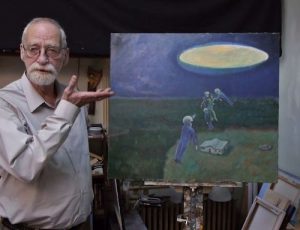David Huggins is a painter from Hoboken, NJ, whose work is primarily dedicated to illustrating his lifelong experiences as an alien abductee. The experiences he describes and paints are not unlike the established alien script that’s been propagated throughout America for over half a century. The way I see it, that’s just as much a reason to believe as it is a reason to be skeptical. This year a movie about Mr. Huggins was released: Love and Saucers: The Far Out World of David Huggins.
Here’s the trailer:
The scenarios he paints are also not without their own ethical conundrums reminiscent of those we encounter in Butler’s fiction. How he tells it, his abductions began when he was 8 years old, and have never stopped. When they began, rather than receive beatings for telling is parents what he saw, one alien told him to keep silent about their visits. Almost a decade later, he lost his virginity to the same alien, a female named Crescent, when he was 17. Since then, Mr. Huggins believes he has sired over fifty hybrid Human/Alien children.
What makes Mr. Huggins unique among professed abductees is the way he’s managed to render his experiences visually. He has taken his experiences out of the realm of his singular account and, through creating these visual testaments, has created objects for viewers to experience as well. It’s a neat little hat trick.
What’s also interesting is the benign and, in ways, loving relationship to his abductors that Mr. Huggins feels. In this interview, he claims to have absolute trust in them. He claims they’ve saved his life more than once. Consistent with Lilith’s Brood and just about every other extra-terrestrial story told, Mr. Huggins was selected to breed alien/human hybrid children. In the interview, his account skirts contradiction when discussing this task. He is asked if he felt violated and if he had any choice in providing the aliens with his body, his genes. He says it was up to him, but only after his initial sexual encounter. Although he professes to being selected from a young age and never long removed from the alien’s retrieval of him, he claims that there is free will.
This leads me to think about interference. I remember a particular instance in this class when Professor McCoy silenced herself during a discussion so as not to interfere with another student’s thought or point. My journal notes from that day read: “Interference. The Oankali interfered. They brought together. Is being “brought together” a product of interference, while being “bound together” reflect an initial sameness?”
In the interview, Mr. Huggins is asked about the way the aliens interfere with his life. Mr. Huggins is also unique as an abductee for the ease with which he accepts and embraces his experience. He harbors no resentment towards the aliens for their interference. He claims they’ve saved his life. In Lilith’s Brood the humans sometimes refer to the Oankali as their saviors. Perhaps interference is a coin toss: Foreign forces are interfering with us constantly, revealing the limits of our control over what happens to us. Perhaps what redeems interference is a new creation, a birth of something.
Huggins in his studio:
